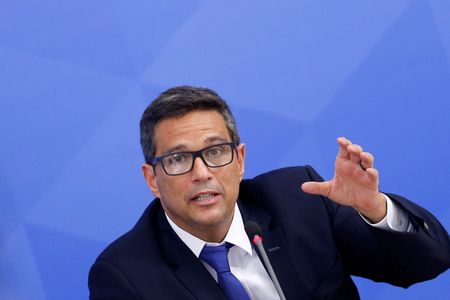By Marcela Ayres
BRASILIA (Reuters) – Brazil’s central bank is not looking to change inflation targets, Governor Roberto Campos Neto said on Monday, resisting calls from President Luiz Inacio Lula da Silva to raise targets.
Campos Neto said that he would oppose any change to the targets, warning that Brazil was currently facing a higher risk premium in financial markets, partly as a result of the debate over whether to set higher inflation targets.
“Our opinion today is that there is no gain in credibility simply by raising the target,” Campos Neto said in a high-profile televised interview on TV Cultura’s Roda Viva.
He said the bank had studied ways to improve its inflation-targeting regime, but that did not extend to studying changing targets.
“We do not consider the target to be an instrument of monetary policy,” Campos Neto said.
Lula has described the height of the official benchmark interest rate, which the central bank left unchanged at a six-year high of 13.75% earlier this month, as an obstacle to economic growth.
The leftist president has argued that Brazil has the highest real interest rate in the world, calling it unjustifiable in the face of cooling consumer price increases.
Lula’s rhetoric has fed speculation of a potential increase to official targets at Thursday’s meeting of the National Monetary Council (CMN), Brazil’s top economic policy body.
Campos Neto said that the Finance Ministry is setting the agenda for CMN votes. The central bank can contribute by presenting its studies on how to make its inflation-targeting regime more effective, he added, without giving details.
“At no time have we defended changing the target to gain more flexibility,” he added.
The CMN typically decides inflation targets in June for the calendar year over three years away, however it has the flexibility to dictate its own agenda. The council is comprised of the finance minister, planning minister, and the central bank governor, so the federal government has two of three votes.
Lula’s comments have led to a deterioration of inflation expectations and a steepening of Brazil’s yield curve, prompting policymakers to emphasize that the deviation of inflation from targets prevents them from starting to cut interest rates.
This year’s inflation target is 3.25%, falling to 3% in 2024 and 2025, with a tolerance of 1.5 percentage points up or down. Private economists surveyed weekly by the central bank project inflation at 5.79% in 2023, 4.0% in 2024, and 3.6% in 2025.
After weeks of attacks from Lula and his allies, Campos Neto struck a conciliatory tone in the interview, suggesting fiscal measures proposed by Finance Minister Fernando Haddad could shorten the horizon for the central bank to start cutting rates.
“The central bank needs to work together with the government and I will do everything in my power to bring the central bank closer to the government,” he said.
Regarding the replacement of two directors whose mandate expires at the end of this month, Campos Neto said Lula has the prerogative to make appointments. But he added that Paulo Souza, the current director of supervision would be “an excellent case for reappointment,” amid indications that he would like to stay.
Regarding the outgoing director of monetary policy, Campos Neto said the role requires significant interaction with the market, so it is important for the next appointee to have technical experience in trading. He said he had signaled to the government that he could provide suggestions if necessary.
(Reporting by Marcela Ayres; Editing by Brad Haynes and Andrea Ricci)

